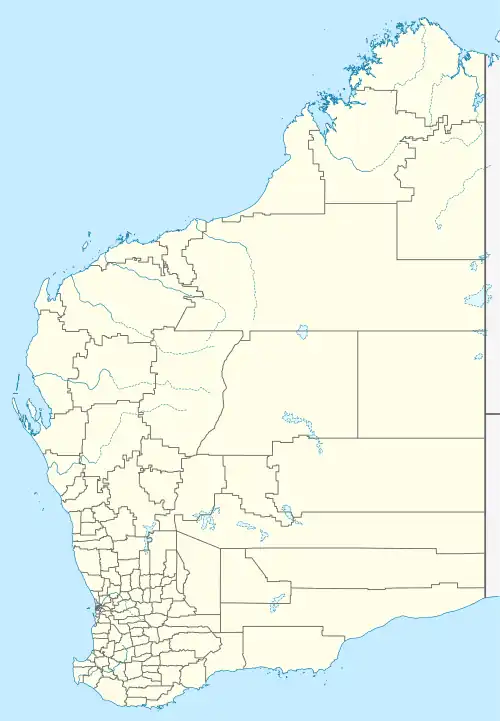 Augustus Island (Wurroolgu) Location of Augustus Island | |
| Geography | |
|---|---|
| Coordinates | 15°21′41″S 124°33′06″E / 15.3614°S 124.5516°E |
| Total islands | 1 |
| Area | 18,992 ha (46,930 acres) |
| Length | 22 km (13.7 mi)[lower-alpha 1] |
| Width | 16 km (9.9 mi)[lower-alpha 1] |
| Administration | |
| State | Western Australia |
| Region | Kimberley |
| Shire | Wyndham-East Kimberley |
| Demographics | |
| Population | 0 |
Augustus Island (Worrorra: Wurroolgu), is an uninhabited island off the Kimberley coast of Western Australia, within the Shire of Wyndham-East Kimberley.
The island is 22 kilometres (14 mi) in length and has a maximum width of 16 kilometres (10 mi)[1] with a total area of 190 square kilometres (73 sq mi)[2] and has an irregular shape. It is at the Southern end of the Bonaparte Archipelago.
The island is found approximately 120 kilometres (75 mi) north-east of Bardi.
Although most of the islands in the Kimberley are unallocated DEC crown land, Jungulu is one of the islands near the former Kunmunya Mission which are included in Reserve 23079 for Use and Benefit of Aborigines.
The island is uninhabited and contains no known feral animals.[3]
Many flora and fauna were isolated from the mainland when sea levels rose and many populations are found intact on the island. The island provides ideal habitat for the Nabarlek, also known as the Little Rock-Wallaby, with the weathered sandstone forming deep fissures.[4]
The golden bandicoot is another vulnerable species that is resident on the island, the last recorded sighting being in 2003. This species favours the Warton sandstone and the heathland on dissected sandstone.[5]
Notes
References
- ↑ "Ocean Dots Encyclopedia - Augustus Island". 2009. Archived from the original on 23 December 2010. Retrieved 21 March 2009.
- ↑ "Bonzle Digital Atlas - Map of Augustus Island". 2009. Retrieved 21 March 2009.
- ↑ "North Kimberley" (PDF). 2001. Archived from the original (PDF) on 30 July 2008. Retrieved 21 March 2009.
- ↑ "Fact Sheet - Narbalek". 2007. Retrieved 21 March 2009.
- ↑ "Isoodon auratus auratus — Golden Bandicoot (mainland)". Department of Environment. 2009. Retrieved 21 March 2009.